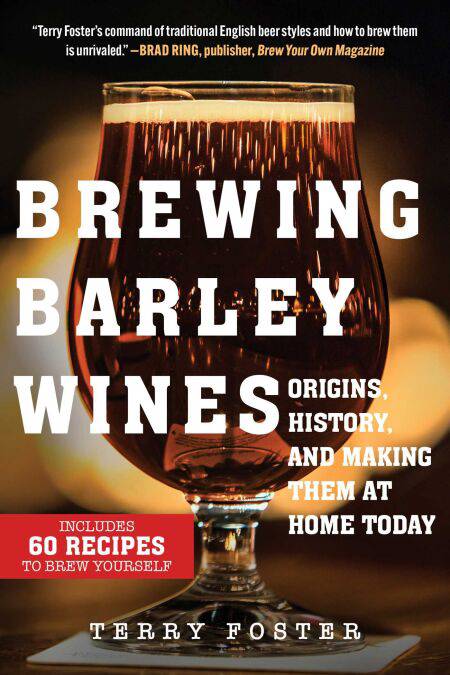
En raison d'une grêve chez bpost, votre commande pourrait être retardée. Vous avez besoin d’un livre rapidement ? Nos magasins vous accueillent à bras ouverts !
- Retrait gratuit dans votre magasin Club
- 7.000.000 titres dans notre catalogue
- Payer en toute sécurité
- Toujours un magasin près de chez vous
En raison de la grêve chez bpost, votre commande pourrait être retardée. Vous avez besoin d’un livre rapidement ? Nos magasins vous accueillent à bras ouverts !
- Retrait gratuit dans votre magasin Club
- 7.000.0000 titres dans notre catalogue
- Payer en toute sécurité
- Toujours un magasin près de chez vous
Brewing Barley Wines EBOOK
Origins, History, and Making Them at Home Today
Terry Foster
Ebook | Anglais
16,76 €
+ 16 points
Description
For Craft Beer Drinkers and Homebrewers Alike
From early English origins to modern American examples like Sierra Nevada’s Bigfoot and Rogue’s XS Old Crustacean, barley wines are a favored style among homebrewers and craft beer drinkers alike. In Brewing Barley Wines, widely respected beer and brewing writer Terry Foster presents the history and development of the style as well as the guidance and expertise necessary to successfully homebrew it yourself.
The book opens with an exploration of the definition of the style from its murky past to somewhat arbitrary modern standards. Foster explores the style guidelines given by the Brewers Association (BA) and the Beer Judge Certification Program (BJCP) and finds them to be narrow, even faulty, showing that many beers not designated as barley wines—including some stock ales, Scotch ales, wheat wines, and even double IPAs—can be said to fit the style. Foster then goes on to give a history of barley wine, which saw its first specifically labeled commercial example as recently as 1903, but which has been produced for centuries under a variety of names. Originally an English style, barley wines were not generally brewed in America until the rise of craft brewing in the late twentieth century. But having cemented a foothold in the New World, with many craft breweries having at least one featured example and sometimes several, barley wines are now rarely produced by British brewers due to heavy taxation on strong beers.
Foster then examines the ingredients used in barley wines as well as best practices and procedures for brewing them, including how to create and successfully manage the high-gravity worts required for making these beers. Finally, Foster provides a collection of sixty recipes showcasing the variety and range of ingredients explored in the book with detailed instructions for making them at home.
Brewing Barley Wines belongs in the library of every craft beer drinker or homebrewer.
From early English origins to modern American examples like Sierra Nevada’s Bigfoot and Rogue’s XS Old Crustacean, barley wines are a favored style among homebrewers and craft beer drinkers alike. In Brewing Barley Wines, widely respected beer and brewing writer Terry Foster presents the history and development of the style as well as the guidance and expertise necessary to successfully homebrew it yourself.
The book opens with an exploration of the definition of the style from its murky past to somewhat arbitrary modern standards. Foster explores the style guidelines given by the Brewers Association (BA) and the Beer Judge Certification Program (BJCP) and finds them to be narrow, even faulty, showing that many beers not designated as barley wines—including some stock ales, Scotch ales, wheat wines, and even double IPAs—can be said to fit the style. Foster then goes on to give a history of barley wine, which saw its first specifically labeled commercial example as recently as 1903, but which has been produced for centuries under a variety of names. Originally an English style, barley wines were not generally brewed in America until the rise of craft brewing in the late twentieth century. But having cemented a foothold in the New World, with many craft breweries having at least one featured example and sometimes several, barley wines are now rarely produced by British brewers due to heavy taxation on strong beers.
Foster then examines the ingredients used in barley wines as well as best practices and procedures for brewing them, including how to create and successfully manage the high-gravity worts required for making these beers. Finally, Foster provides a collection of sixty recipes showcasing the variety and range of ingredients explored in the book with detailed instructions for making them at home.
Brewing Barley Wines belongs in the library of every craft beer drinker or homebrewer.
Spécifications
Parties prenantes
- Auteur(s) :
- Editeur:
Contenu
- Nombre de pages :
- 288
- Langue:
- Anglais
Caractéristiques
- EAN:
- 9781510766945
- Date de parution :
- 16-09-24
- Format:
- Ebook
- Protection digitale:
- Adobe DRM
- Format numérique:
- ePub

Les avis
Nous publions uniquement les avis qui respectent les conditions requises. Consultez nos conditions pour les avis.






